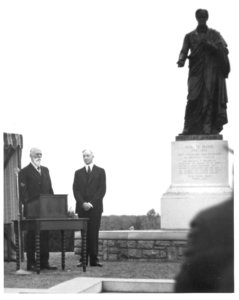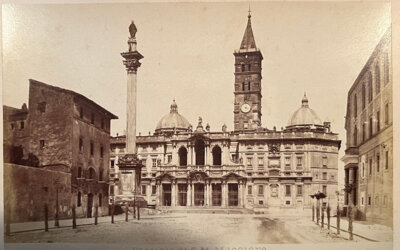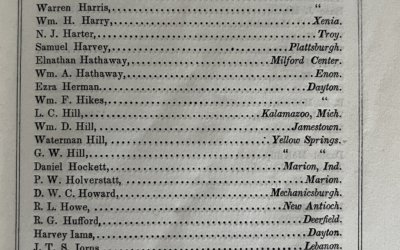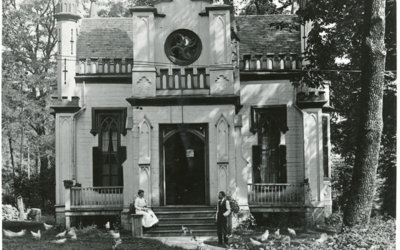Though relatively unknown today, Homer Caldwell Corry (1887-1955) was a hero of Antioch College in many ways. A member of the class of 1910, he grew up in nearby Clark County, was a star baseball pitcher when Antioch still had intercollegiate athletics and a leading member of the student literary society The Adelphian Union.

Homer C. Corry (at right) about to make remarks accepting the gift of the Horace Mann Statue from Hugh Taylor Birch, October 1936.
After a brief career as a high school principal in both Enon and Yellow Springs, he studied law at The University of Chicago and Ohio State where he was also briefly a member of the law school faculty. Corry enlisted in the military during the first world war, where he rose from infantry private to an officer in the Judge Advocate General’s office. After the war he joined a law firm in Springfield that was for many years the primary legal representative of Antioch. The firm exists to this day. Corry served the first of many terms on the Antioch Board of Trustees beginning in 1917, and spent the rest of his career pursuing financial security for the College so that its president could concentrate on the real business at hand, the education of young people.
At the dedication ceremony for the statue of Horace Mann in Glen Helen, held in 1936, Corry followed the remarks made by Hugh Taylor Birch, reprinted in the preceding Songs From The Stacks. In contrast to Birch’s lofty, devotional speech about his hero Horace Mann, Corry delivered a straight, factual recounting of Mann’s life and career. He also describes the setting for the original Mann statue outside the Massachusetts Statehouse, and gives perhaps the most useful description to be found for the statue’s rather remote location. Based on the address reprinted below, Corry had clearly done his homework as any good lawyer would do.
from Educating For Democracy: A Symposium, Antioch Press, 1937.
Horace Mann, Pioneer in Education
HOMER C. CORRY
IT IS with a deep sense of appreciation and gratitude that I accept on behalf of Antioch College this beautiful and appropriate gift. It is appropriate, not only because it is a magnificent statue of the first President of Antioch College, but also because of the one who gives it.
Hugh Taylor Birch is an alumnus of the College, and his associations with it and its first President are most cherished. They unite in a vivid and very real way Horace Mann’s life with the national commemoration of his work which begins here today.
Mr. Birch is the son of Erasmus Mitchell Birch who as a young teacher in eastern New York knew Horace Mann. He was an early Trustee of the College, and gave to it large tracts of land, assistance which materially sustained and encouraged Horace Mann in his difficult financial problems.
In 1856, at Mann’s invitation, Erasmus Birch moved to Yellow Springs. Hugh, his youngest son, soon became the playmate of Benny Mann, and the youthful comrade of Horace Mann. He knew and shared the friendly life of the President’s home. He furnishes to us today tangible evidence of Horace Mann’s inspiration and influence, which the simplicity and usefulness and nobility of his own life exemplify.
The history of this statue is notable. It is the only replica of the original which was modeled by Emma Stebbins in Rome and cast in bronze in Munich. Here, after the passage of years, the model was rediscovered by Mr. Birch, and upon his order, it was reproduced in bronze in the same foundry, by the son of the man who had cast the original.
When one approaches the front entrance of the Massachusetts State House, one sees on either side the statues of two illustrious sons of Massachusetts—Daniel Webster and Horace Mann. There they stand, facing the historic Boston Common and the St. Gaudens statue of Colonel Robert Gould Shaw and the colored 54th Regiment of Massachusetts infantry. One might well imagine Horace Mann reading from the lines on that statue by St. Gaudens,
With heart that beat a charge, he fell forward as fits a man,
But the high soul burns on to light mens feet,
Where death for noble ends makes dying sweet.
These lines fitly describe the dedication of his own life to the cause of human freedom, not only freedom of the black man from the bondage of slavery, but freedom of all men from the bondage of ignorance and prejudice.
It is appropriate that this statue should be located here, on what is now part of the Antioch campus and was formerly a farm owned by Horace Mann, In this quiet and beautiful spot he doubtless intended to live when his active responsibility with the College should have ended. Here his statue stands looking across beautiful Glen Helen to the College to which he gave his last full measure of devotion and in which his spirit and achievements still live.
Its location here upon the highest point in the county, above the tranquil and varied country extending to far horizons, is symbolic of the almost unlimited outreach of his own hope for the advancement of humanity. Here one may literally follow his injunction, “Orient yourself,” and find one’s bearings anew in a confused and troubled world.
Its location here, high and seemingly alone, is like much of his work for humanity. There is an inevitable loneliness in genius, and because such a one lives above and beyond his day, he ofttimes lacks the full measure of understanding which should be his.
Its location here is symbolic of his own appraisal of the West and of its boundless opportunities. Mrs. Mann said of him, “The poetry of the broad prairies, which to other hearts spoke only of desolation, was to his exalted state of mind, as he passed over them, freedom—freedom from all that fettered or darkened the human soul through the agency of man.”
Events ofttimes find their source in incidents seemingly far removed in time and circumstances. As I have already suggested, one might trace one source of today’s event to an afternoon in the fall of 1856, when a tall and distinguished gentleman met a little boy on one of the unpaved streets of Yellow Springs. His kindly interest soon put the boy at ease and began a comradeship which ripened with the years and inspired a lifetime devotion for the man and his ideals. One might trace another source of today’s event to a more remote time and place. On May 4, 1796, Horace Mann was born in the town of Franklin, Massachusetts. His parents were plain, but of superior mental attainments and with the strength of character so characteristic of the New Englanders of that day. Here Horace Mann lived the then hard and simple life of a farm boy, ennobled by the high conceptions of life of that Puritan environment.
When he was thirteen his father died, and through the discipline of poverty and toil he came to know the priceless value to youth of education. During these early years of struggle, there was already forming in his character the predominant aspiration of his life. Mr. Mann once said of himself to a friend, “All of my boyish castles in the air had reference to doing something for the benefit of mankind, and I had a conviction that knowledge was my needed instrument.” Soon opportunity came to him in the form of a skilled teacher of the classics, and he accepted this opportunity with such fervor that in six months he had prepared himself for the sophomore class at Brown University.
This larger opportunity he again accepted, with the surpassing ability that was to mark him for distinctive achievement. Here, too, the altruistic aspirations of his life took more definite form, as is indicated by his commencement oration, which was on the advancement of the human race.
During his years at Brown University, Horace Mann gave deep thought to his choice of vocation. It was natural that in a new republic the profession of law should be of high importance. The theory of constitutional government, the application of the principles of self-government, and the practice of democracy were new things and gave vivid promise for the betterment of mankind.
He chose to become a lawyer, therefore, and after two years as a tutor in Latin and Greek at Brown University he entered upon the study of law at Litchfield, which was the first and then the most famous law school in America. As he had taken first honors in college, so did he here. The law, its order and philosophy, its purposes of justice, and its relation to government and society enlisted the deepest interest of his brilliant mind.
In 1823 he entered the practice of law at Dedham, Massachusetts. He was not only devoted to the law, but he had a keen sense of civic duty. His standing was soon established as a lawyer of the highest quality. He devoted himself to the mastery of legal principles, and his practice was controlled and guided by a most conscientious intellectual honesty.
The years at Dedham were the happiest of his life. While here he married Charlotte Messer, the daughter of the president of Brown University. But the bright years ended on the last night of July, 1832, when her life came to its close. Darkness and despair came over him, and it was only through the sympathy and understanding of friends that he was brought back to a proportioned sense of life and duty.
Through the invitation of his friend and classmate, E. G. Loring, he entered the practice of law in Boston. Here he boarded at the home of Mrs. Clark, where were also Jared Sparks, the historian; Miss Elizabeth Peabody, who became noted for her work in the establishment of kindergartens; Miss Sophia Peabody, afterwards the wife of Nathaniel Hawthorne; and Miss Mary Peabody, whom Horace Mann later married.
From 1823 to 1837 Mann had an active and distinguished career as a lawyer and as a member of the state legislature and senate, of which he was president for two years. His passion for liberty, and the application of his great ability to the interests of humanity, were soon apparent. His first speech in the legislature was on behalf of religious liberty; his second was on behalf of railroads and was the first speech on that subject in any legislative assembly in America.
One of his most significant achievements was the establishment of the first hospital in the United States for the insane. Prior to that time mental defectives had been harbored in prisons and poorhouses. He instituted the principle of kindly and intelligent treatment
for mental defectives. The education of the blind likewise enlisted his efforts. He was a leader in the temperance movement, and in the forefront of the opposition to slavery. Above all he gave unrestrained devotion to the cause of education.
At the age of forty-one, with a career of certain fame and distinction before him as a lawyer, he turned from it to accept the newly created position of secretary to the Massachusetts Board of Education. In accepting this offer, he wrote to Governor Everett, “So long as I hold this office, I shall devote myself to the supremest welfare of mankind on earth.”
I shall not tell the story of that struggle and victory. He did more than promote and improve the common schools of America and establish “the absolute right to an education of every human being that comes into the world.” He lifted the ideals and practice of democracy itself.
For twelve years he served no other client than his state and the cause of education. In 1848, however, he yielded to the insistent demand of his friends and entered Congress to fill out the unexpired term of John Quincy Adams. John Quincy Adams had given himself to the cause of freedom in his battle for the right of petition. Horace Mann had already dedicated his life to the cause of human liberty. He was an eloquent opponent of human slavery in all its social and political implications. He was not an abolitionist. He was not in accord with Wendell Phillips or William Lloyd Garrison, nor was he in accord with Webster, and those who were willing to compromise with the issue of human slavery and its extension.
For a generation Daniel Webster had been the great apostle of political liberty, and of a united nation under constitutional government. But ofttimes under the constant impact of circumstance, the consecration of men to their ideals becomes dulled. Daniel Webster at this time will always stand as one of the tragic figures of America history. Perhaps his vision may have been clouded by his still living but oft-thwarted ambition to be president. His fears were perhaps real that a break in the Union was imminent. In the midst of the dangerous crosscurrents of national life, facing the possibility that the Union to which he had been so signally devoted would be disunited, he made his famous seventh of March speech advocating compromise upon the extension of slavery.
Horace Mann, controlled by moral purpose, with perhaps a clearer vision of the future and with a courage that knew no limitations of time or occasion or ambition, felt the duty of answering Webster. This he did. He incurred Webster’s enmity and the opposition of the Whigs in Massachusetts, and these form the background of his return to the cause of education.
In 1852 Mann was nominated by the Free Soil Party for the governorship of Massachusetts, but there had come another call—to the presidency of Antioch College. For him there came again the necessary choice between political preferment and the cause of education. His choice is known.
Recurring again as the dominating motives of his decision are his intense interest in humanity and the supremacy of his moral nature. These furnish the key to his life and his achievements.
On September 13,1853, as he left Massachusetts, he addressed the Free Soil Convention at Fitchburg. His closing words were as follows: “It rejoices me to think in giving you a sad, though kind farewell, that the last three words I shall utter before a Massachusetts audience are the three words—temperance, education, freedom.”
As an experienced man of affairs, an able lawyer, an eminent statesman, and a great educator, Horace Mann came to Antioch College. He came also as an idealist, the controlling passion of whose life was the improvement of mankind. These last three words were more than a key to his philosophy—they are the essential formula for the advancement of humanity. Freedom can come only through the enlightenment of mankind. It can be useful only as it is directed to right purposes through education and moral discipline. He came to establish a college as broad in its principles as these three words—a college devoted to the cause of universal education. Here men and women were to have equal opportunity. Antioch was open to those of any color or creed or class. Merit was the only condition of admission.
He planned to do more. He would elevate science from a position of obscurity to its rightful proportion in the educational scheme. Art and music with their cultural influences were to be essential. Physiology was to be taught and health was to be emphasized as fundamental to achievement through life. Teachers were to be instructed in the art of their vocation. Here there were united in one system education and character. To him education without religion was worse than no education at all. The diploma was more than a certificate of work done—it was a certificate of character. Education in all of its aspects was to have an immediate relationship to its practical social value. These ideals he expressed in his inaugural address when he dedicated the College to two great objects “which can never be rightly separated, the honor of God and the service of man.”
Antioch College was launched under the auspices of the Christian Church, with lofty ideals of freedom and service which gave promise that the hopes of Horace Mann would ripen into achievement. I believe that his hopes have been so fulfilled, but only because he conquered difficulties that were not foreseen and which hastened his death.
When Mr. and Mrs. Mann arrived at Antioch, the buildings were not completed, and the campus was wholly undeveloped. There were many discomforts and annoyances, but they were incidental and gave Horace Mann slight concern. There were other fundamental weaknesses, however: a divided authority and a bankrupt institution. From these and other causes, Antioch was sold on April 20, 1859, at auction. It was purchased by friends of Horace Mann and of the College, and turned over to a new Board free from debt, with a new workable charter, which, with the amendments since that time, is still the charter of the College.
The future of the institution now seem assured, but these troubles had enlisted the most strenuous efforts of Horace Mann for months prior to that time. The Commencement of 1859 was a time of rejoicing, but the strain had been too great; he was too tired to rest. Told, as the end approached, that he had but a few hours to live, he said, “I have work to do”; and he called to him his family, and in beautiful converse they reviewed their lives together. Then one after another the students came. With each he talked and to each he gave some personal message.
The spirit of Horace Mann is immortal. His personality became a part of every work and every life that he touched. In the truest sense it is embodied in this institution and its principles. His pioneering spirit, his devotion to truth, his moral fervor, his insistence upon the social purposes of education and its necessity in a democracy are still incorporated in the Antioch of this day.
Engraved upon another monument to him which stands upon another part of the campus are the words of his last address: “Be ashamed to die until you have won some victory for humanity.” They are the story of his life; but they are more. They are the very spirit and purpose of education. They have become a controlling motive, not only in the lives of students and graduates of this institution, but through the universal opportunity of education they have been transfused into the lives of unnumbered citizens.
I should like to close with the eloquent words of John D. Philbrick, superintendent of the public schools of Boston, from an address delivered at the dedication of the monument in 1865.
“To my mind this figure symbolizes, and will ever symbolize, as often as my eyes rest upon it, the grand and inspiring idea of Progress—that idea which was at once the faith and inspiration of Horace Mann. He believed in, and therefore he labored for, the progress of mankind—the progress of the individual in intellectual, moral and physical excellence, and consequently in happiness and usefulness; the progress of the state in freedom and justice, and consequently in national prosperity and power. Universal education he regarded as the divinely appointed means—education sanctified by religion—of realising this grand idea, and therefore as the essential instrument of political improvement and social advancement.”
“Songs From the Stacks” is a regular selection from Antiochiana: the Antioch College archives by College Archivist Scott Sanders.



